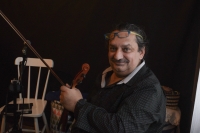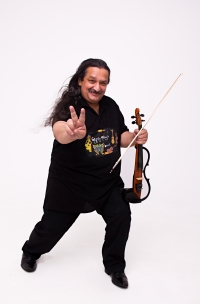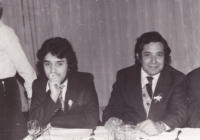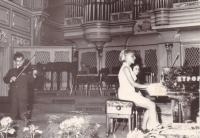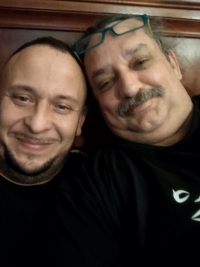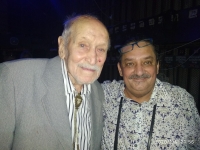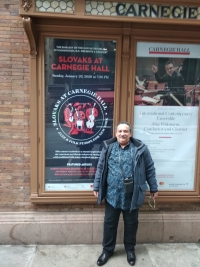They put me on the table, I played the big violin, the guys had something to drink and I had a lot of chocolates, and it was good
Ján Berky Jr., was born on July 4, 1962 in Zvolen, with strong Očová’s roots. As a child, his whole family moved to Bratislava, where he basically lives to this day. An unforgettable memory and start in the life of music was the children’s violin, which he received when he was only four years old. As a little boy, he lived in Rusovce, in a manor house on the third floor, where he successfully attended primary school. Before studying at the conservatory, he already lived in Bratislava, in Karlova Ves. Ján therefore graduated from the violin department at the Bratislava Conservatory. His father and mother paid great attention to the upbringing of their children, and this also applied to his studying outcomes. Ján Berky comes from a classic family of four, from Bratislava, consisting of mother, father and sister Eva. His father, Ján Berky the Elder, was an important Slovak violinist. The memorial remembers how he always wanted to promote more jazz in his father’s music, there were even conflicts because of chords at home. Today, he would have done more things differently since he found out that his father was right, and especially in simplicity, there was beauty. Even his sister Eva, who also devoted herself to music, did not be a match for someone. Also Jan’s mother was a talented student at the conservatory in Brno, where she studied singing. Ján is very proud of his Romani origins and, according to him, Romani musicians were the bearers of folklore, but unfortunately, it cannot be said at present. There was a great demand for these musicians, so people postponed weddings because of them, if they could not attend to play theirs. Ján believes that politics has never been for musicians. Ján believes that politics has never been for musicians. However, he also talks about compromise, because if music should work, if songs or albums should be created, there must be a certain financial but also a political patron. He is also considered anti-human, against all extremist manifestations. At the time of the revolution in 1989, Ján was in Germany, where he spent a month because of performing in one of the Hainburg theaters. When he returned home, he was already returning to a free country. Ján did not experience the fall of the wall in Germany, because he was already at home at that time. However, he remembers that when the Germans united, especially in the East part of the country, there was a “hunger for culture”. The then “Jarovské violin” was in great demand at that time and played so vivaciously. Personally, Ján has never encountered racism as a child. It was later, in adulthood, that he was touched by several unflattering allusions because of his Roma origins, especially during concerts. But it wasn’t, nothing serious. He became famous mainly for the Orchestra “Diabolské violin”, of which he was a part. Today, he has a beautiful family, made up of his wife Vierka, who teaches in kindergarten, and a talented daughter, who is more interested in singing than making music like her father. A big dream of Ján Berky Jr. is the establishment of a radio with a studio where it would be broadcast live. He has an idea of Slovak bands that would go there to present themselves, whether in modern or even classical music. He even mentioned it to the Assistant Secretary of the Ministry of Culture, who liked the idea very much, but at this time, absorbed by the corona crisis, it is not yet feasible.
